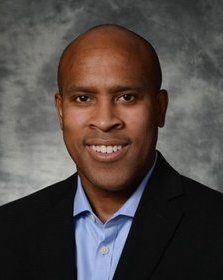The Department is extremely pleased to welcome four distinguished colleagues– Scarlett Bellamy, Aaron Foster, DeJuran Richardson and Alisa Stephens– who will join our adjunct faculty and provide career mentorship for students and junior faculty from historically marginalized groups.
We will be featuring interviews with each adjunct faculty member over the next few weeks.
 Alumnus Aaron Foster, ScD ’00
Alumnus Aaron Foster, ScD ’00
What is your current position at your home institution?
Vice President, Business Analytics & Insights at Pfizer Inc.
Business analytics is the science of driving better business decisions and having a competitive advantage to how you use statistics and data to make them. I lead a global business analytics organization supporting all of Pfizer’s core innovative businesses: Vaccines, Oncology, Rare Disease Immunology & Inflammation, Internal Medicine and Hospital products.
What do you enjoy most about your job?
I enjoy the impact we have on patients in the pursuit of addressing many of the most devastating diseases, and as part of this, the process of solving real-world problems leveraging data and analytics.
What research are you currently working on?
There are number of areas that I am proud, but some of the most timely and impactful research my team is driving is research to support the COVID-19 vaccination campaigns. We know we have a challenge to achieve herd immunity in the United States. Dr. Anthony Fauci, the Director of the National Institute of Allergy and Infectious Disease, has stated that it may take 70-85% of the populace to be vaccinated to achieve herd immunity. Yet studies of American’s willingness to get vaccinated shows that we may fall short of achieving these levels.
My team recently conducted research with a sample of Americans hesitant to get vaccinated in support of a recently launch public service campaign. Please find one of Public Service Announcement (PSA) videos here (please share!). The video draws on the emotional reasons for getting vaccinated, the memories and occurrences that cannot be replaced.
Where did you grow up? Can you point to something in your life that may have influenced your decision to study biostatistics?
I grew up in a predominantly Black neighborhood of Boston, MA. Biostatistics addressed two core passions in my life. One is mathematics and using it to solve real-life problems; the second is health and the disparities in health care and outcomes for marginalized groups in the U.S. and globally.
Can you describe your educational and career pathway and any challenges you faced along the way?
My educational pathway feels traditional. I was a mathematics major at Morehouse College, and by Junior year, I was trying to figure out where I would go to next with my degree. I was fortunate enough to meet a Harvard School of Public Health dean who was recruiting at Black colleges, and she educated me about biostatistics, eventually changing the course of my life. Towards the end of my studies in biostatistics, I felt a desire to explore business, so I took a consulting role at a large accounting and consulting firm, KPMG. There, I practiced across industries, until I left to get back into health care at Pfizer.
I have suffered setbacks and challenges along the way, but I generally do not dwell on them. I learned from my father that, “you can do anything you wan to do, as long as you work hard.” I didn’t listen to this when I was very young, but eventually I adopted it and just never give up.
How do you feel being Black impacted your educational and career opportunities and experiences?
I am always envious of the expectations of success that peers who do not look like me receive, whether or not they are deserving of these expectations. Generally, I have not received that benefit of doubt, whether it was my high school geometry teacher who tried to persuade my parents to switch me to remedial math class or other instances of resistance, my path has had obstacles. Noting this, I also have had tremendous influencers in my career as well. Some of them right here in the department. These influencers have helped me achieve a level of success that I am proud of, but I continue to be concerned that it is difficult for me and others like me to break out into opportunities outside of our functional expertise and take on roles in other parts of the business.
What’s the biggest lesson you’ve learned or bit of wisdom you can impart to students or junior faculty from historically marginalized groups?
Determine the outcome you wish to achieve and never give up. My department pathway, and some of my some Black peers, had real obstacles that had to be overcome to achieve success. But I did see success happen for me and so many of my Black friends.



